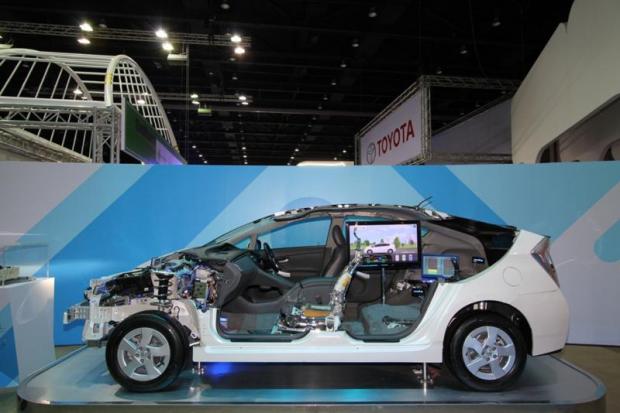
Toyota Motor Thailand plans to be the first carmaker in the country to cut the retail price of hybrid electric vehicles (HEVs), in line with the lower excise tax the company was granted last week under Board of Investment (BoI) privileges.
Chairman Ninnart Chaithirapinyo said Toyota's new HEV models, which the Japanese carmaker is about to make at the Gateway City Industrial Estate in Chachoengsao province, will be sold at discounted prices in line with the excise tax cut. HEV model retail prices will be cut by a maximum of 12.5%.
"Real prices will be cut in accordance with the new excise tax rate by another 2-12.5%," Mr Ninnart said. "This will be sufficient to attract Thai motorists to buy locally made HEVs."
But he declined to give further details about when HEV operations will start, saying only that HEV models of the Camry sedan will also be sold at the new, lower prices.
The government approved in March this year promotional privileges for EVs, including tax holidays of five to eight years. The privileges focus on production of HEVs, plug-in hybrid electric vehicles (PHEVs) and battery electric vehicles (BEVs), part of plans for Thailand to become an EV production hub.
The BoI promotions include those for passenger cars, pickups and buses, with different privileges based on production technology.
On June 20, the government announced additional measures with new excise tax incentives for HEV and PHEV passenger cars under the BoI's promotional scheme.
Excise tax will be cut from a range of 25% to 5% based on CO2 emissions, while BEVs will be taxed at just 2%, down from 10%.
Passenger pickup vehicles and double-cab pickups that release CO2 at less than 175 grammes per kilometre under the HEV platform will be taxed at 23% and 10%, down from 25% and 12%, respectively.
The tax privileges, aimed at promoting locally made EVs, are to expire in late 2025. The deadline to submit applications for HEV privileges is Dec 29, while the deadline for PHEVs is the end of 2018.
Toyota is the first company to have applied for and received the BoI privileges. The firm assembles 7,000 HEVs a year, makes 70,000 batteries for electric cars and also produces other parts such as doors, bumpers and front/rear axles totalling 9.1 million units a year.
Its total investment stands at 19.016 billion baht, while Toyota expects to rely on domestic parts worth 13.3 billion a year.
According to BoI secretary-general Hiranya Sujinai, Toyota is to start HEV assembly next year.
Mr Ninnart said that with the government's promotional privileges for EVs, the firm hopes to upgrade the country's auto industry with higher-technology vehicles.
PHEVs and BEVs, in particular, still have limited sales volume, partly due to a lack of charging stations to support the use of EVs, resulting in limited sales over the past few years.
HEV sales were limited by high prices, Mr Ninnart said.
"Toyota aims to make HEV models the common platform for the Thai market before developing the models further to PHEV, BEV and fuel-cell EVs in the long run," he said.